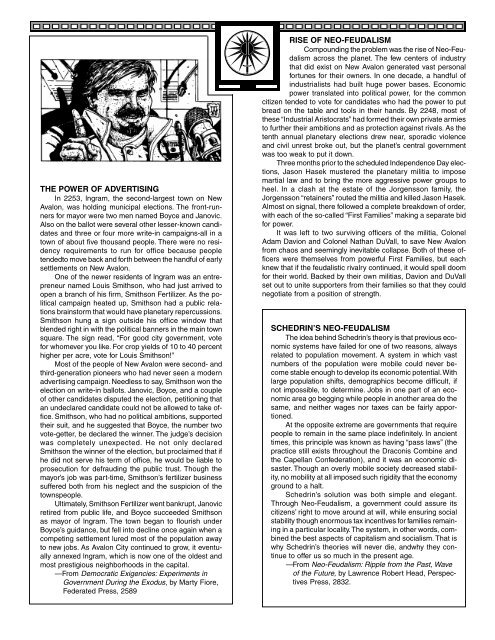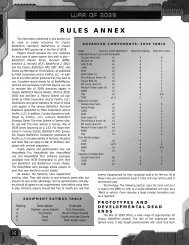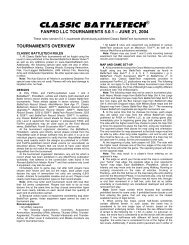You also want an ePaper? Increase the reach of your titles
YUMPU automatically turns print PDFs into web optimized ePapers that Google loves.
THE POWER OF ADVERTISING<br />
In 2253, lngram, the second-largest town on New<br />
Avalon, was holding municipal elections. The front-runners<br />
for mayor were two men named Boyce and Janovic.<br />
Also on the ballot were several other lesser-known candidates<br />
and three or four more write-in campaigns-all in a<br />
town of about five thousand people. There were no residency<br />
requirements to run for office because people<br />
tendedto move back and forth between the handful of early<br />
settlements on New Avalon.<br />
One of the newer residents of lngram was an entrepreneur<br />
named Louis Smithson, who had just arrived to<br />
open a branch of his firm, Smithson Fertilizer. As the political<br />
campaign heated up, Smithson had a public relations<br />
brainstorm that would have planetary repercussions.<br />
Smithson hung a sign outside his office window that<br />
blended right in with the political banners in the main town<br />
square. The sign read, “For good city government, vote<br />
for whomever you like. For crop yields of 10 to 40 percent<br />
higher per acre, vote for Louis Smithson!”<br />
Most of the people of New Avalon were second- and<br />
third-generation pioneers who had never seen a modern<br />
advertising campaign. Needless to say, Smithson won the<br />
election on write-in ballots. Janovic, Boyce, and a couple<br />
of other candidates disputed the election, petitioning that<br />
an undeclared candidate could not be allowed to take office.<br />
Smithson, who had no political ambitions, supported<br />
their suit, and he suggested that Boyce, the number two<br />
vote-getter, be declared the winner. The judge’s decision<br />
was completely unexpected. He not only declared<br />
Smithson the winner of the election, but proclaimed that if<br />
he did not serve his term of office, he would be liable to<br />
prosecution for defrauding the public trust. Though the<br />
mayor’s job was part-time, Smithson’s fertilizer business<br />
suffered both from his neglect and the suspicion of the<br />
townspeople.<br />
Ultimately, Smithson Fertilizer went bankrupt, Janovic<br />
retired from public life, and Boyce succeeded Smithson<br />
as mayor of lngram. The town began to flourish under<br />
Boyce’s guidance, but fell into decline once again when a<br />
competing settlement lured most of the population away<br />
to new jobs. As Avalon City continued to grow, it eventually<br />
annexed lngram, which is now one of the oldest and<br />
most prestigious neighborhoods in the capital.<br />
—From Democratic Exigencies: Experiments in<br />
Government During the Exodus, by Marty Fiore,<br />
Federated Press, 2589<br />
RISE OF NEO-FEUDALISM<br />
Compounding the problem was the rise of Neo-Feudalism<br />
across the planet. The few centers of industry<br />
that did exist on New Avalon generated vast personal<br />
fortunes for their owners. In one decade, a handful of<br />
industrialists had built huge power bases. Economic<br />
power translated into political power, for the common<br />
citizen tended to vote for candidates who had the power to put<br />
bread on the table and tools in their hands. By 2248, most of<br />
these “Industrial Aristocrats” had formed their own private armies<br />
to further their ambitions and as protection against rivals. As the<br />
tenth annual planetary elections drew near, sporadic violence<br />
and civil unrest broke out, but the planet’s central government<br />
was too weak to put it down.<br />
Three months prior to the scheduled Independence Day elections,<br />
Jason Hasek mustered the planetary militia to impose<br />
martial law and to bring the more aggressive power groups to<br />
heel. In a clash at the estate of the Jorgensson family, the<br />
Jorgensson “retainers” routed the militia and killed Jason Hasek.<br />
Almost on signal, there followed a complete breakdown of order,<br />
with each of the so-called “First Families” making a separate bid<br />
for power.<br />
It was left to two surviving officers of the militia, Colonel<br />
Adam <strong>Davion</strong> and Colonel Nathan DuVall, to save New Avalon<br />
from chaos and seemingly inevitable collapse. Both of these officers<br />
were themselves from powerful First Families, but each<br />
knew that if the feudalistic rivalry continued, it would spell doom<br />
for their world. Backed by their own militias, <strong>Davion</strong> and DuVall<br />
set out to unite supporters from their families so that they could<br />
negotiate from a position of strength.<br />
SCHEDRIN’S NEO-FEUDALISM<br />
The idea behind Schedrin’s theory is that previous economic<br />
systems have failed for one of two reasons, always<br />
related to population movement. A system in which vast<br />
numbers of the population were mobile could never become<br />
stable enough to develop its economic potential. With<br />
large population shifts, demographics become difficult, if<br />
not impossible, to determine. Jobs in one part of an economic<br />
area go begging while people in another area do the<br />
same, and neither wages nor taxes can be fairly apportioned.<br />
At the opposite extreme are governments that require<br />
people to remain in the same place indefinitely. In ancient<br />
times, this principle was known as having “pass laws” (the<br />
practice still exists throughout the Draconis Combine and<br />
the Capellan Confederation), and it was an economic disaster.<br />
Though an overly mobile society decreased stability,<br />
no mobility at all imposed such rigidity that the economy<br />
ground to a halt.<br />
Schedrin’s solution was both simple and elegant.<br />
Through Neo-Feudalism, a government could assure its<br />
citizens’ right to move around at will, while ensuring social<br />
stability though enormous tax incentives for families remaining<br />
in a particular locality. The system, in other words, combined<br />
the best aspects of capitalism and socialism. That is<br />
why Schedrin’s theories will never die, andwhy they continue<br />
to offer us so much in the present age.<br />
—From Neo-Feudalism: Ripple from the Past, Wave<br />
of the Future, by Lawrence Robert Head, Perspectives<br />
Press, 2832.




